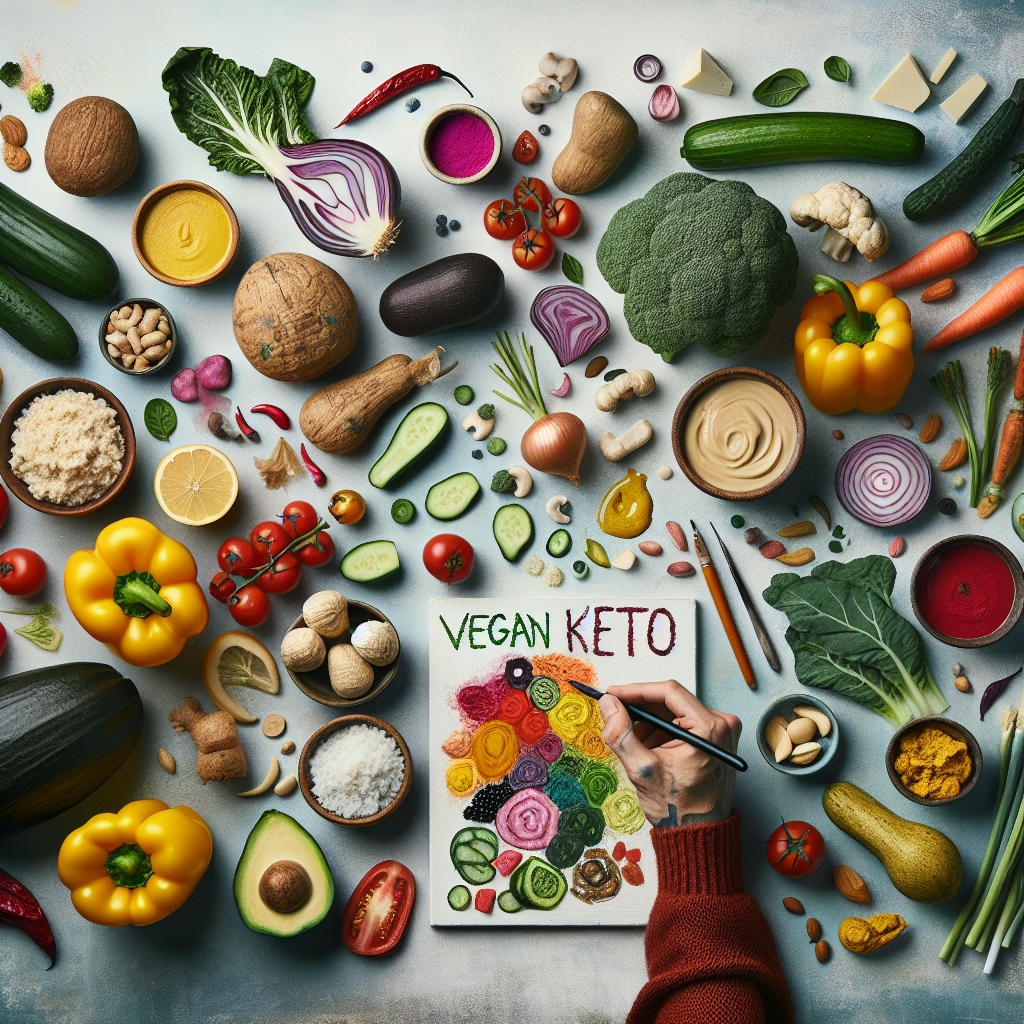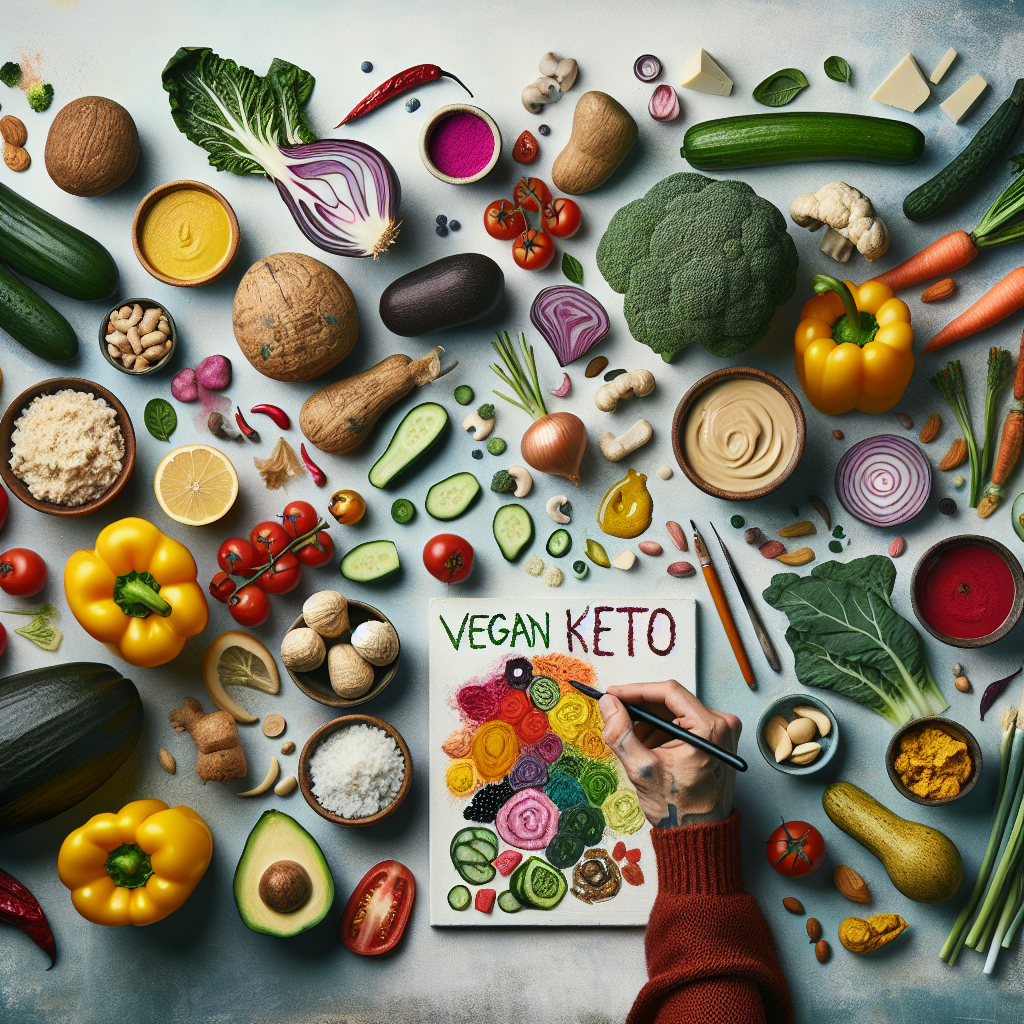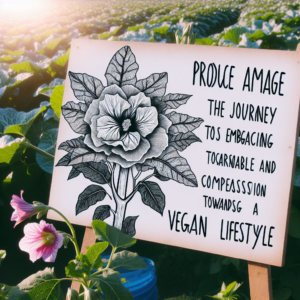We’re excited to introduce the latest trend in the world of diets and nutrition: Vegan Keto. Combining the principles of a plant-based lifestyle with the low-carb, high-fat approach of the ketogenic diet, Vegan Keto offers a unique solution for those seeking a sustainable and healthy way to eat. In this article, we’ll be exploring the benefits, challenges, and delicious options of this innovative dietary choice. Whether you’re a vegan looking to break free from the carb-heavy norms or a keto enthusiast searching for plant-based alternatives, Vegan Keto is here to offer a new and exciting path to nourishment. Get ready to discover a whole new world of flavors and possibilities!
What is Vegan Keto
Vegan Keto is a dietary approach that combines the principles of veganism and the ketogenic diet. It focuses on consuming plant-based foods that are low in carbohydrates and high in healthy fats. This unique combination promotes weight loss, improves energy levels, and offers numerous health benefits.
Definition of Vegan Keto
Vegan Keto is a variation of the traditional ketogenic diet that eliminates all animal products, including meat, dairy, eggs, and other animal-derived ingredients. It emphasizes the consumption of plant-based foods such as vegetables, nuts, seeds, and healthy oils while restricting carbohydrate intake to achieve a state of ketosis.
Benefits of Vegan Keto
- Weight Loss: The ketogenic diet, including the vegan version, has been shown to be effective for weight loss by promoting fat burning and reducing appetite. By following a vegan keto diet, individuals can experience the benefits of weight loss while adhering to their ethical or environmental principles.
- Increased Energy Levels: When the body reaches a state of ketosis, it becomes more efficient in using fat for fuel. This can result in steadier energy levels throughout the day, without the crashes often associated with high-carb diets.
- Improved Insulin Sensitivity: By cutting out high-carbohydrate foods, Vegan Keto can lead to improved insulin sensitivity. This can be beneficial for individuals with type 2 diabetes or those who are at risk of developing it.
- Reduced Inflammation: Many plant-based foods are rich in antioxidants and anti-inflammatory compounds, which can help reduce chronic inflammation in the body. Following a vegan keto diet that focuses on whole, unprocessed foods can potentially lower the risk of inflammatory diseases.
- Enhanced Mental Clarity: The ketogenic diet has been linked to improved cognitive function and mental clarity. This can be attributed to the stable energy levels and the ketones produced during ketosis, which are an alternative fuel source for the brain.
- Lowered Risk of Chronic Diseases: A well-planned vegan keto diet can provide an abundance of vitamins, minerals, and phytonutrients that support overall health. This, in turn, may lower the risk of chronic illnesses, such as heart disease, certain cancers, and neurodegenerative disorders.
Vegan Keto Food List
Vegan Sources of Protein
Protein is an essential macronutrient that plays a critical role in muscle building, tissue repair, and overall health. While animal products are typically high in protein, there are plenty of plant-based alternatives suitable for a vegan keto diet.
Here are some excellent vegan protein sources for vegan keto:
- Tempeh: A fermented soy product that offers approximately 15 grams of protein per 3-ounce serving.
- Seitan: Made from wheat gluten, seitan boasts a high protein content, with around 21 grams per 3-ounce serving.
- Tofu: A versatile and widely available soy-based product, tofu provides about 8 grams of protein per 3-ounce serving.
- Edamame: These young soybeans contain about 8 grams of protein per half-cup serving.
- Lentils: A legume known for its protein content, lentils offer approximately 9 grams of protein per half-cup serving.
Vegan Keto: A Plant-Powered Twist on the Low-Carb Lifestyle
Healthy Fats for Vegan Keto
While following a vegan keto diet, it is crucial to consume adequate amounts of healthy fats to maintain ketosis and provide essential nutrients. Here are some healthy, plant-based fat options for a vegan keto lifestyle:
- Avocado: A rich source of monounsaturated fats, avocados provide a creamy texture and approximately 15 grams of fat per medium-sized fruit.
- Coconut Oil: This tropical oil is high in medium-chain triglycerides (MCTs), a type of fat that can be quickly converted into ketones for energy.
- Olive Oil: With its high content of heart-healthy monounsaturated fats, olive oil is an excellent choice for the vegan keto diet.
- Nuts and Seeds: Almonds, walnuts, chia seeds, and flaxseeds are all great sources of healthy fats, fiber, and essential nutrients.
Low-Carb Vegetables for Vegan Keto
Choosing low-carb vegetables is key to maintaining ketosis and ensuring a well-rounded vegan keto diet. These vegetables are packed with fiber, vitamins, and minerals, while still being low in carbohydrates:
- Leafy Greens: Spinach, kale, Swiss chard, arugula, and other leafy greens are rich in nutrients and low in net carbs.
- Cruciferous Vegetables: Broccoli, cauliflower, Brussels sprouts, and cabbage are excellent choices as they are low in carbohydrates and high in fiber.
- Zucchini: This versatile vegetable can be spiralized into noodles or used as a low-carb replacement for pasta.
- Bell Peppers: These colorful vegetables are low in carbs and can be a flavorful addition to vegan keto meals.
- Asparagus: Packed with nutrients and minerals, asparagus is also low in carbohydrates, making it a great choice.
By incorporating these vegan protein sources, healthy fats, and low-carb vegetables into your diet, you can create a balanced and nutritious vegan keto meal plan.
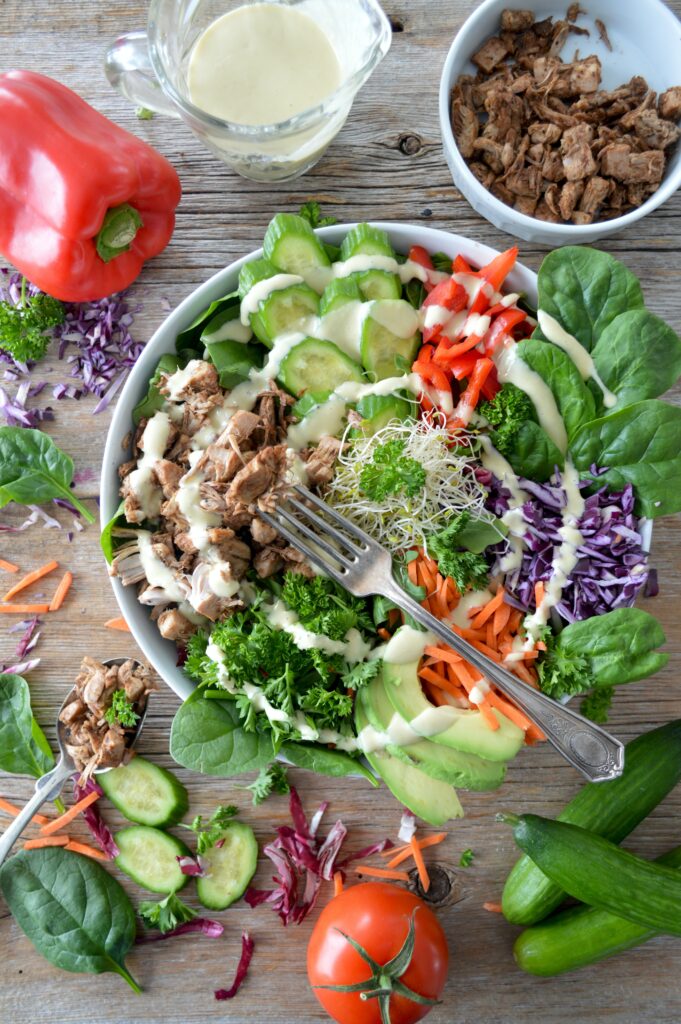
Meal Planning for Vegan Keto
Creating a Balanced Vegan Keto Meal
When planning meals on a vegan keto diet, it is essential to focus on achieving a balance of macronutrients and incorporating a variety of whole, plant-based foods. Here’s a general guide to creating a balanced vegan keto meal:
- Protein: Include a serving of plant-based protein in each meal, such as tempeh, tofu, seitan, or legumes like lentils or chickpeas.
- Healthy Fats: Incorporate a source of healthy fats, such as avocado, coconut oil, nuts, or seeds, to provide satiety and support ketosis.
- Low-Carb Vegetables: Fill your plate with a generous portion of leafy greens, cruciferous vegetables, and other low-carb options to provide fiber, vitamins, and minerals.
Sample Vegan Keto Meal Plan
To help you get started, here’s an example of a one-day vegan keto meal plan:
- Breakfast: Vegan keto smoothie made with unsweetened almond milk, spinach, avocado, and vegan protein powder.
- Lunch: Grilled tempeh salad with mixed greens, cherry tomatoes, cucumber, and a drizzle of olive oil and lemon juice.
- Snack: Raw almonds or a small portion of macadamia nuts.
- Dinner: Zucchini noodles with a creamy avocado sauce, topped with sautéed mushrooms and cherry tomatoes.
- Dessert: Vegan keto chocolate mousse made with coconut cream, unsweetened cocoa powder, and a natural low-carb sweetener.
This sample meal plan is just one example, but it demonstrates how you can create a well-balanced vegan keto diet that incorporates a variety of flavors and nutrients.
Vegan Keto Recipes
Vegan Keto Breakfast Recipes
- Vegan Keto Chia Pudding: Combine chia seeds, unsweetened almond milk, and a natural low-carb sweetener. Let the mixture sit overnight, and in the morning, enjoy a creamy and nutritious breakfast pudding.
- Tofu Scramble: Crumble tofu and sauté it with your choice of low-carb vegetables, such as onions, bell peppers, and spinach. Season with turmeric, nutritional yeast, and spices for a delicious vegan keto breakfast option.
Vegan Keto Lunch and Dinner Recipes
- Tempeh Bacon Lettuce Wraps: Marinate tempeh slices in a smoky and savory marinade, then grill or pan-fry until crispy. Serve the tempeh bacon wrapped in lettuce leaves, alongside avocado slices and tomato.
- Vegan Keto Cauliflower Fried Rice: Pulse cauliflower florets in a food processor until they resemble rice grains. Sauté the cauliflower “rice” with low-carb vegetables, such as broccoli, carrots, and peas, in sesame oil and tamari sauce.
Vegan Keto Snack Recipes
- Spiced Roasted Chickpeas: Drain and rinse a can of chickpeas, then toss them in a mixture of olive oil, salt, and spices like paprika, cumin, and garlic powder. Roast in the oven until crispy for a protein-packed and crunchy snack.
- Coconut Fat Balls: Combine unsweetened shredded coconut, almond flour, coconut oil, and a natural low-carb sweetener. Roll the mixture into bite-sized balls and refrigerate until firm for a satisfying and energizing snack.
Vegan Keto Dessert Recipes
- Avocado Chocolate Pudding: Blend ripe avocados, unsweetened cocoa powder, almond milk, and a natural low-carb sweetener until smooth and creamy. Chill in the refrigerator for a decadent and healthy vegan keto dessert.
- Almond Butter Fat Bombs: Mix almond butter, coconut oil, cacao nibs, and a natural low-carb sweetener. Spoon the mixture into small molds or ice cube trays and freeze until solid. Enjoy these bite-sized treats for a fat-rich sweet indulgence.
By experimenting with these delicious vegan keto recipes, you can enjoy a wide range of meals, allowing you to sustain your vegan keto lifestyle while savoring flavorful dishes.
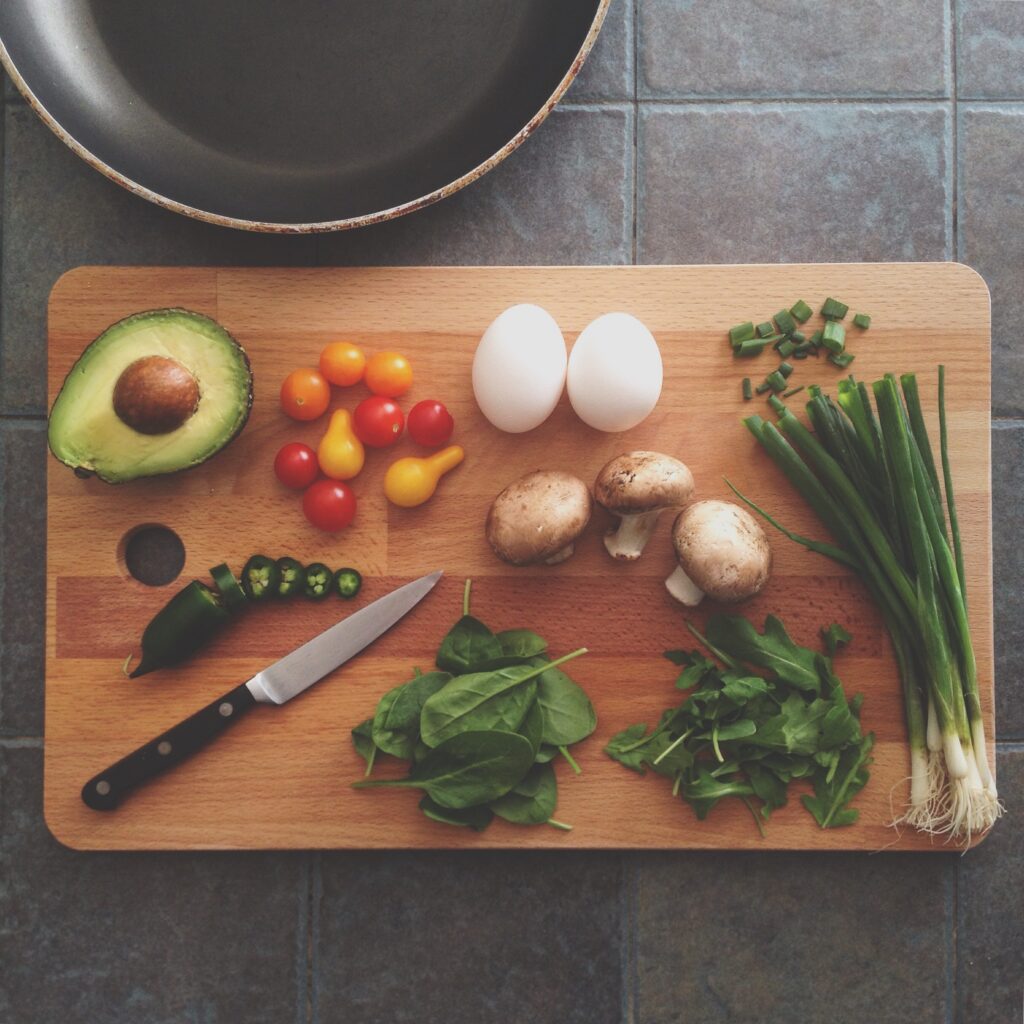
Tips for Success on Vegan Keto
Monitoring Macros and Nutrients
While following a vegan keto diet, it is essential to monitor your macronutrient intake to ensure you are achieving the desired balance. Tracking your protein, fat, and carbohydrate consumption using a food diary or mobile app can help you stay on track and maintain ketosis.
It’s also important to pay attention to essential nutrients that may be lacking in a vegan keto diet, such as vitamin B12, omega-3 fatty acids, and iron. Consider including fortified foods or supplements to meet your nutritional needs.
Staying Hydrated on Vegan Keto
Proper hydration is key for overall health and can also help alleviate potential side effects of the ketogenic diet, such as constipation and fatigue. Aim to drink at least eight glasses of water per day, and consider incorporating herbal teas or sugar-free electrolyte drinks to support hydration.
Adjusting to Vegan Keto
Transitioning to a vegan keto diet may require some adjustments, both mentally and physically. Be patient with yourself as your body adapts to using fat for fuel instead of carbohydrates. It’s normal to experience temporary symptoms like fatigue, headaches, or cravings during this adjustment period.
Seeking Professional Guidance
If you’re new to veganism or the ketogenic diet, it may be beneficial to seek guidance from a registered dietitian or nutritionist experienced in vegan keto. They can ensure you are meeting your nutritional needs and offer personalized advice based on your health goals and preferences.
Possible Challenges and Solutions on Vegan Keto
Navigating Social Situations
Social situations, such as dining out or attending events, can pose challenges on a vegan keto diet. To overcome this, plan ahead by researching menu options in advance or bringing your own keto-friendly dish. Communicate your dietary needs to others and don’t be afraid to ask for modifications or substitutions when necessary.
Managing Cravings and Hunger
Restricting carbohydrates can sometimes lead to cravings or feelings of hunger. To manage this, focus on incorporating satiating foods high in healthy fats and fiber. Snacking on nuts, seeds, and vegetables can help curb cravings and keep you satisfied between meals.
Avoiding Nutrient Deficiencies on Vegan Keto
With the elimination of certain food groups, it’s important to ensure you’re meeting your nutritional needs on a vegan keto diet. To avoid nutrient deficiencies, consider taking supplements or including fortified foods to ensure an adequate intake of vitamins and minerals.
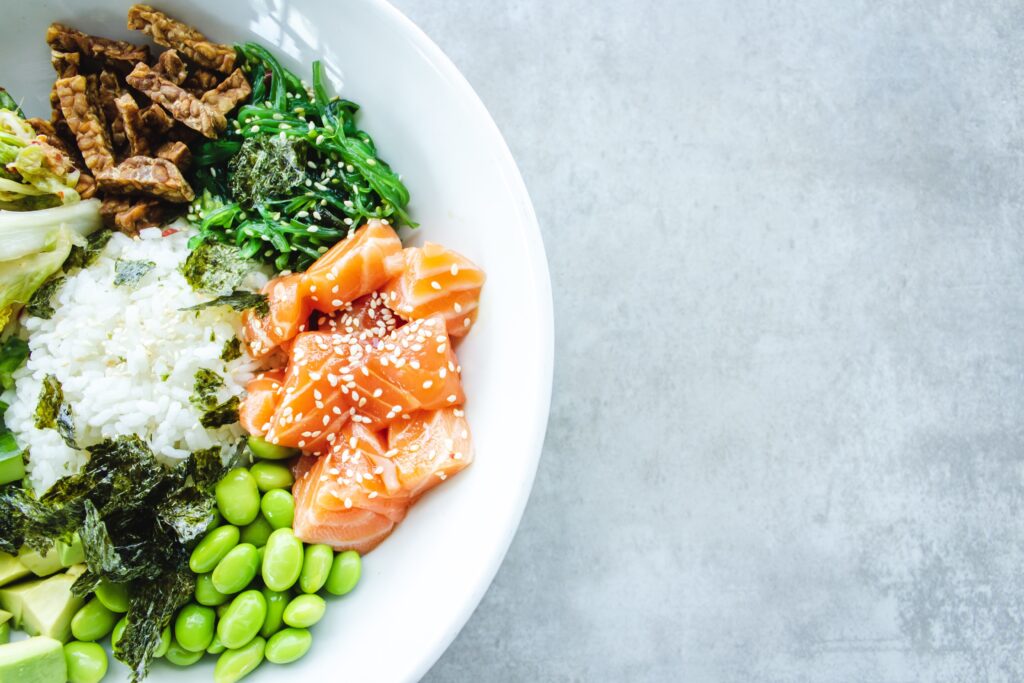
Exercise and Vegan Keto
Choosing the Right Exercise Routine
Physical activity is an essential component of a healthy lifestyle, regardless of dietary preferences. Choose an exercise routine that aligns with your interests and goals, whether it be strength training, yoga, cycling, or any other form of exercise that you enjoy. Regular exercise can enhance overall well-being and complement the benefits of a vegan keto diet.
Fueling Your Workouts on Vegan Keto
While on a vegan keto diet, it’s important to provide your body with the fuel it needs for exercise. Prioritize consuming a small portion of protein and healthy fats before your workout. Consider options like a protein shake made with vegan protein powder and almond milk or a handful of almonds with a tablespoon of coconut oil.
Common Mistakes on Vegan Keto
Relying Too Heavily on Processed Vegan Foods
With the increasing popularity of veganism and the ketogenic diet, many processed vegan and keto-friendly alternatives have emerged. While convenient, these foods can be high in sodium, additives, and unhealthy fats. It’s best to use them sparingly and focus on whole, unprocessed plant-based foods for optimal nutritional value.
Not Consuming Enough Fiber
Fiber is crucial for digestive health, blood sugar control, and satiety. Some individuals on a vegan keto diet may inadvertently reduce their fiber intake due to limited carb sources. To prevent this, incorporate plenty of low-carb vegetables, nuts, seeds, and avocados into your meals to ensure an adequate fiber intake.
Neglecting Micronutrient Intake
The vegan keto diet may require careful attention to micronutrient intake, as some nutrients are primarily found in animal products. Focus on including foods rich in plant-based sources of omega-3 fatty acids, vitamin B12, iron, and calcium. If necessary, consider supplementation or fortified alternatives to prevent deficiencies.
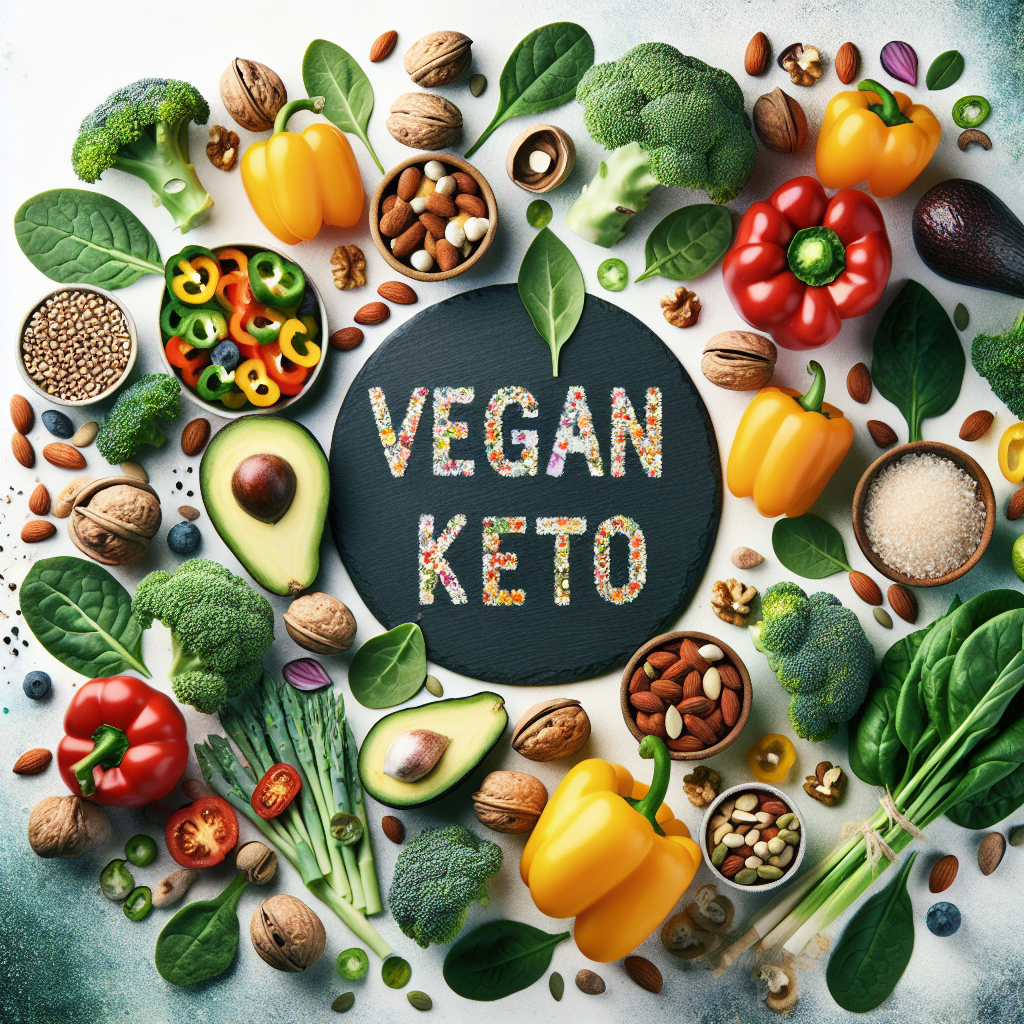
Is Vegan Keto Sustainable?
Long-Term Sustainability of Vegan Keto
The sustainability of a vegan keto diet largely depends on individual preferences, dietary needs, and lifestyle factors. Some people may find it challenging to maintain a strict vegan keto diet in the long run, while others thrive and enjoy the benefits. It is crucial to listen to your body and make adjustments as needed.
Alternatives to Vegan Keto
While vegan keto may not be a sustainable long-term approach for everyone, there are alternatives that can still align with a plant-based lifestyle. High-protein vegan diets, whole food plant-based diets, or a more balanced approach with mindful carbohydrate consumption may be viable options to consider.
Conclusion
Vegan Keto represents a unique dietary approach that combines the principles of veganism and the ketogenic diet. By focusing on plant-based foods that are low in carbohydrates and high in healthy fats, individuals can experience weight loss, increased energy levels, improved insulin sensitivity, reduced inflammation, and numerous other health benefits.
With a variety of vegan protein sources, healthy fats, and low-carb vegetables, it is possible to create delicious and satisfying meals on a vegan keto diet. By monitoring macronutrient intake, staying hydrated, and seeking professional guidance if needed, individuals can overcome potential challenges and enhance their chances of success.
While Vegan Keto may not be sustainable for everyone in the long term, there are alternative approaches that can still align with a plant-based lifestyle. Whether you choose to pursue Vegan Keto or explore other options, it’s important to listen to your body, prioritize nutrient-dense foods, and make choices that support your overall well-being. Ultimately, finding the right balance for your individual needs and goals is the key to a successful and sustainable dietary journey.
